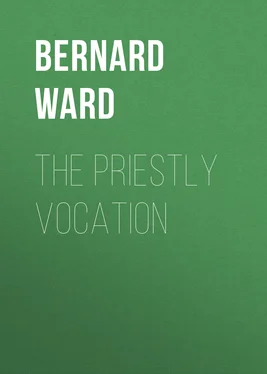Bernard Ward - The Priestly Vocation
Здесь есть возможность читать онлайн «Bernard Ward - The Priestly Vocation» — ознакомительный отрывок электронной книги совершенно бесплатно, а после прочтения отрывка купить полную версию. В некоторых случаях можно слушать аудио, скачать через торрент в формате fb2 и присутствует краткое содержание. Жанр: foreign_prose, foreign_religion, Философия, foreign_psychology, foreign_antique, на английском языке. Описание произведения, (предисловие) а так же отзывы посетителей доступны на портале библиотеки ЛибКат.
- Название:The Priestly Vocation
- Автор:
- Жанр:
- Год:неизвестен
- ISBN:нет данных
- Рейтинг книги:3 / 5. Голосов: 1
-
Избранное:Добавить в избранное
- Отзывы:
-
Ваша оценка:
- 60
- 1
- 2
- 3
- 4
- 5
The Priestly Vocation: краткое содержание, описание и аннотация
Предлагаем к чтению аннотацию, описание, краткое содержание или предисловие (зависит от того, что написал сам автор книги «The Priestly Vocation»). Если вы не нашли необходимую информацию о книге — напишите в комментариях, мы постараемся отыскать её.
The Priestly Vocation — читать онлайн ознакомительный отрывок
Ниже представлен текст книги, разбитый по страницам. Система сохранения места последней прочитанной страницы, позволяет с удобством читать онлайн бесплатно книгу «The Priestly Vocation», без необходимости каждый раз заново искать на чём Вы остановились. Поставьте закладку, и сможете в любой момент перейти на страницу, на которой закончили чтение.
Интервал:
Закладка:
It was a new idea to the people and one of which the world had never before heard. The poor have ever formed the vast majority of mankind; yet the instinct has always been to look down upon them. The ancient Romans looked upon the needy and the afflicted as the object of the malediction of the gods. A story is told of one of the Emperors sending a whole shipload of them to sea, and having the vessel sunk, so as to rid the city of their presence. The Jews had indeed learnt something less opposed to the truth; but even they looked upon Poverty as a misfortune. A promise of an earthly reward was necessary as a stimulus to lead them on to do their duty. "I am the Lord thy God, who brought thee out of the land of Egypt, out of the house of bondage." "Honour thy father and thy mother, that thou mayest be long lived upon the land which the Lord thy God will give thee." A modest competency was to them the minimum that was put before them to deliver them from care and anxiety. "Give me neither beggary nor riches: give me only the necessaries of life." 12 12 Prov. xxx. 8.
Yet they knew that if the poor were faithful to God, He would protect them; and indeed that one of the attributes of the God of the Jews was His providential care of the poor. "He shall judge the poor of the people, and he shall save the children of the poor, and he shall humble the oppressors. . . . He shall deliver the poor from the mighty, and the needy that had no helper. He shall spare the poor and needy; and he shall save the souls of the poor." 13 13 Ps. lxxxi. 4, 12.
Our Lord in His teaching, however, went far beyond anything which even the Jews had before their minds, when He proclaimed that Poverty was the true state of blessedness. His first recorded words as official teacher of mankind are "Blessed are the poor in spirit, for theirs is the kingdom of heaven." In another passage we read still more explicitly, 14 14 St. Luke vi. 20.
"Blessed are ye poor, for yours is the kingdom of God; Blessed are ye that hunger now, for you shall be filled; Blessed are ye that weep now, for you shall laugh; . . . but woe to you that are rich, for you have your consolation. Woe to you that are filled, for you shall hunger; woe to you that now laugh, for you shall mourn and weep." He is here putting the state of poverty forward as the state of blessing, more to be desired than the state of riches.
The same idea we find enforced by our Lord in His teaching in numerous instances. He speaks of as "the Mammon of Iniquity," so intimately connected does He consider them with vice. More than that. He speaks as though the salvation of a rich man was so difficult as to be almost a test of God's omnipotence. "It is easier for a camel to pass through the eye of a needle than for a rich man to enter into the Kingdom of God. . . . With man it is impossible; but with God all things are possible." 15 15 St. Matt. xix. 24, 26.
Consider also some of our Lord's parables in this regard. The well-known one of Dives and Lazarus at once occurs to mind. The rich man is not accused of any particular evil; but simply he lived trusting in his riches, the selfish life of which they are so often the foundation. He "was clothed in purple and fine linen and feasted sumptuously every day"; while Lazarus "lay at his gate full of sores, desiring to be filled with the crumbs that fell from the rich man's table"; and it is added almost as a matter of course that after death their lots are reversed. Abraham is depicted as saying to the rich man, "Son, remember that thou didst receive good things in thy lifetime, and likewise Lazarus evil things; but now he is comforted, and thou are tormented." 16 16 St. Luke xvi. 19, 25.
In another parable we have placed before us one who trusted so much in his accumulated wealth that he said to himself, "Thou hast much good laid up for many years, take thy rest, eat, drink, make good cheer"; and the merited rejoinder is "Thou fool; this night do they require thy soul of thee, and where shall those things be which thou hast provided?" 17 17 St. Luke xii. 20.
These examples might be multiplied indefinitely.
There is no danger of the virtue of poverty being lost sight of by the Church. The whole attitude of the clergy and devout laity affords opportunities of charity to the poor. Not only do they practise almsgiving to a degree far beyond any question of strict duty, but many of them give themselves to personal work among the poor, which is more valuable than silver and gold, while the modern active congregations of nuns are fully appreciated especially for the work that they do among the poor. One of the most sanctifying phases of a priest's life is his close contact with the poor. The man of the world at best looks upon them as persons to be pitied, to be relieved, to be helped; in modern times, they teach them to combine together to insist on the betterment of their state—a movement with which, if carried on with proper responsibility and care, the Church is in full sympathy. But so long as the world goes on, so long there will be poor people in it, and to the Christian, still more to the priest, the natural attitude is something bordering on reverence for the poor; for to them Christian virtues such as humility, work, self-denial, obedience, come almost naturally as the accompaniment of their state. Their very necessities almost compel them to seek comfort from God in prayer. Many of the poor indeed neglect these advantages and make their poverty a source of discontent and even murmuring against Divine Providence in this regard. Equally a rich man may practise poverty of spirit; but it does not come easily. "How hardly shall they who have riches enter into the kingdom of God." 18 18 St. Mark x. 23.
While however a priest easily understands the sanctifying effects of poverty in others, there is a real danger that he may fail to appreciate it in himself. The anxious and worrying effect on the mind, the continuous trouble as much as the self-denial necessitated by the conditions of his life seem to interfere with his power of prayer and with the proper sanctification of his duties. Yet in truth the facing of such conditions may react in a far more sanctifying way than the prayers and devotions which they impede: the prayer of a poor man in anxiety and distress, even though a distracted prayer, may be more efficacious than the ordinary prayer of the man in comfortable circumstances.
Thank God, in England there is no chance of a priest being anything else than a poor man. But there are degrees of poverty amongst us according to the missions at which we are stationed and other circumstances; and from the fact of the general state being inevitable, we are apt to lose sight of its value and long for positions where we have to practise it less rather than more.
It is well for us then to think over and apply to ourselves the fact that Poverty as such should be looked upon as a true blessing, to be desired as the ordinary means by which our lives may be raised up and made like to that of our Divine Master. True, indeed, our wish should be for whatever surroundings will best enable us to carry out the work which God has destined for us individually; and whatever He sends us, we joyfully accept. But so far as we have any wish or longing, the blessing we should prefer should not be riches, but poverty, for that make us more like to Him.
It is just here, when we come to reduce theory to practice, that our state contrasts with that of a religious. In one sense—and a true sense—they practise the virtue in its fulness, and we should never underestimate the spirit of self-sacrifice necessary in order to have nothing that they can call their own. But in another sense, religious poverty may be easier to practise than that with which a secular priest is faced. For their wants are always provided for, and they are free from the anxieties of poverty with which we are familiar. St. Ignatius gives it as one of the fruits of whole-hearted sacrifice in the Society, that it relieves its members of all care. They live indeed in what may be called in the words of Pope Leo XIII "frugal comfort," such as befits men who are poor; but they are free from anxiety. For St. Alphonsus it was not enough that his subjects should use things that are cheap; but he wished that they should be rough and common things, so that the spirit of poverty might not be wanting. And many inconveniences distinctive of poverty are common to all religious. But so long as their order or congregation exists and flourishes they need have no care or anxiety for themselves or their future.
Читать дальшеИнтервал:
Закладка:
Похожие книги на «The Priestly Vocation»
Представляем Вашему вниманию похожие книги на «The Priestly Vocation» списком для выбора. Мы отобрали схожую по названию и смыслу литературу в надежде предоставить читателям больше вариантов отыскать новые, интересные, ещё непрочитанные произведения.
Обсуждение, отзывы о книге «The Priestly Vocation» и просто собственные мнения читателей. Оставьте ваши комментарии, напишите, что Вы думаете о произведении, его смысле или главных героях. Укажите что конкретно понравилось, а что нет, и почему Вы так считаете.












